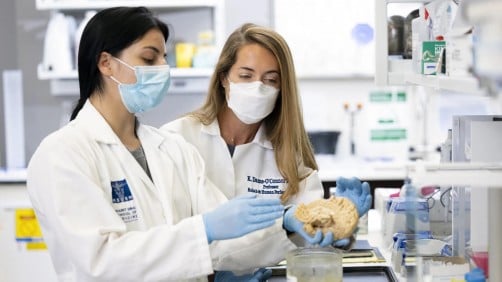Health
Mount Sinai Study Reveals CTE Rare in Isolated Brain Injuries

Research conducted by the Brain Injury Research Center of the Mount Sinai Health System has found that Chronic Traumatic Encephalopathy (CTE) is uncommon among individuals with isolated brain injuries. The findings, published on October 18 in the Journal of Neuropathology & Experimental Neurology, highlight the significance of understanding the relationship between head injuries and CTE, which has gained considerable attention in recent years.
CTE is a progressive neurodegenerative disease linked to repetitive head trauma, often identified in individuals with extensive exposure to impacts, particularly in contact sports like American football. The condition is characterized by abnormal accumulations of tau protein in the brain and has been less frequently reported in individuals exposed to head trauma through other means, such as military service or intimate partner violence.
Kristen Dams-O’Connor, PhD, Director of the Brain Injury Research Center and senior author of the study, pointed out that previous research primarily focused on male American football players, leaving a gap in knowledge regarding the prevalence of CTE in other populations. “Our study underscores that CTE is rare among individuals with lower amounts of repetitive head impact and in those with isolated traumatic brain injuries,” she stated. Dams-O’Connor emphasized the importance of community-based research to broaden the understanding of CTE beyond select populations.
Understanding the distinctions between various types of head injuries is crucial. The research team clarified terms such as traumatic brain injury (TBI), which refers to a blow to the head resulting in loss of consciousness or other symptoms. In contrast, a blow to the head is an isolated injury not meeting diagnostic criteria for TBI. Repetitive head impacts refer to a series of impacts that may or may not lead to acute symptoms, whereas extensive repetitive head impacts involve over five years of exposure.
The Mount Sinai research team analyzed postmortem brain tissue from 47 donors affiliated with the Late Effects of Traumatic Brain Injury Project between 2018 and 2024. This prospective study involves over 500 participants living with TBI who undergo clinical assessments and neuroimaging, along with those who donate their brains for research after death. Researchers compiled comprehensive trauma histories from medical records, autopsy reports, and structured family interviews.
Using advanced neuropathologic techniques, including tau immunohistochemistry and postmortem MRI scanning, the team diagnosed CTE based on established consensus criteria. Among the 47 decedents, seven cases of autopsy-confirmed CTE were identified. Notably, six donors had extensive histories of repetitive head impacts, while one case involved two severe isolated TBIs without known repetitive impacts.
Enna Selmanovic, a PhD candidate at the Icahn School of Medicine and first author of the study, remarked, “This study adds to our understanding of how common or rare CTE really is.” Selmanovic noted that while the findings reinforce the link between CTE and extensive repeated head impacts, they also highlight the necessity of exploring how different types of head trauma relate to CTE risk.
The research underscores the need for continued investigation in diverse populations to shift the conversation from assumption to evidence. As awareness of brain injuries and their potential long-term effects grows, accurate information is essential to alleviate confusion and anxiety among individuals who have experienced various forms of head trauma.
The Mount Sinai Health System, one of the largest academic medical systems in the New York metropolitan area, employs approximately 48,000 individuals across seven hospitals and over 400 outpatient practices. The system is committed to advancing health care by tackling complex medical challenges and supporting communities with high-quality care.
For more information about Mount Sinai Health System, visit their official website or follow them on social media platforms.
-

 Science4 weeks ago
Science4 weeks agoALMA Discovers Companion Orbiting Giant Red Star π 1 Gruis
-

 Top Stories2 months ago
Top Stories2 months agoNew ‘Star Trek: Voyager’ Game Demo Released, Players Test Limits
-

 Politics2 months ago
Politics2 months agoSEVENTEEN’s Mingyu Faces Backlash Over Alcohol Incident at Concert
-

 World2 months ago
World2 months agoGlobal Air Forces Ranked by Annual Defense Budgets in 2025
-

 World2 months ago
World2 months agoMass Production of F-35 Fighter Jet Drives Down Costs
-

 World2 months ago
World2 months agoElectrification Challenges Demand Advanced Multiphysics Modeling
-

 Business2 months ago
Business2 months agoGold Investment Surge: Top Mutual Funds and ETF Alternatives
-

 Science2 months ago
Science2 months agoTime Crystals Revolutionize Quantum Computing Potential
-

 Top Stories2 months ago
Top Stories2 months agoDirecTV to Launch AI-Driven Ads with User Likenesses in 2026
-

 Entertainment2 months ago
Entertainment2 months agoFreeport Art Gallery Transforms Waste into Creative Masterpieces
-

 Health2 months ago
Health2 months agoGavin Newsom Critiques Trump’s Health and National Guard Plans
-

 Business2 months ago
Business2 months agoUS Government Denies Coal Lease Bid, Impacting Industry Revival Efforts









